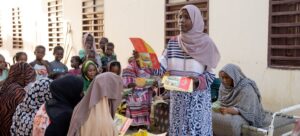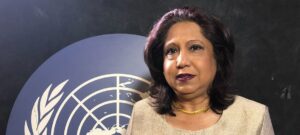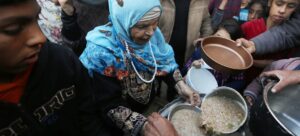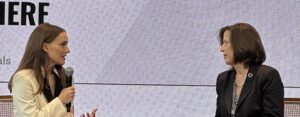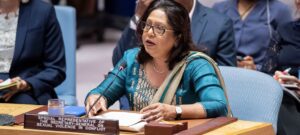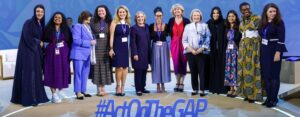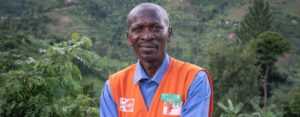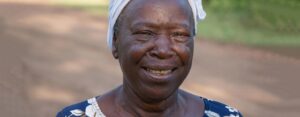In an interview with UN Under-Secretary-General for Global Communications Melissa Fleming on the sidelines of SDG Summit 2023 held at UN Headquarters in New York in September, Ms. Portman discussed combatting violence against women and reframing masculinity to be less aggressive and more empathetic towards gender issues.
Melissa Fleming: The UN 2023 Gender Snapshot report painted a worrisome picture on how far away we are from reaching gender equality. What can we do to shift these trends?
Natalie Portman: Investing in women and girls’ education, safety and economic and social empowerment. More investment will accelerate the drive toward parity.
Melissa Fleming: Why is there under-investment in girls?
Natalie Portman: There is a deeply ingrained bias against women and girls that we really need to combat and obviously, education is a big part of that. The Spotlight Initiative that the UN launched [in partnership with the European Union and others] in 2017 is addressing a lot of the ingrained cultural biases that lead to the inequalities and injustices that we see.
It really is such a core part of women’s freedom to be free from the threat of violence. And until women and girls can feel safe walking down the street, going to school and going to work, nothing else can be achieved to the extent that we dream of.
Spotlight’s work has been really extraordinary at reaching many different countries to change laws, implement educational tools and change culture such that masculinity is reframed as empathy rather than aggression.
Young girls in the village of Danja in Niger hold signs in support of the Spotlight Initiative.
Melissa Fleming: We now have an online environment that has made a dangerous and threatening space for so many girls growing up in the social media age. Is that something you are concerned about?
Natalie Portman: Absolutely. The threat and danger that women and girls are subjected to in real life is just as bad, if not worse, online. I mean, it’s all different varieties of trying to silence us.
The more we can support and celebrate women and girls’ voices, the more we’re combating this horrible abuse of power.
Melissa Fleming: You were very much behind the Time’s Up movement supporting victims of sexual harassment. Why is it so important for women in Hollywood to raise their voices? Does this set an example for women in other industries?
Natalie Portman: Time’s Up was incredible because we gathered with women in other industries as well. We gathered with female farm workers, healthcare workers, journalists and women in tech and we noticed we were all facing the same sorts of challenges. Obviously in different locations or different flavours, but really the same threat.
The head of the Farm Workers Union, Monica Ramirez, said to me, “They tell us to shut up because we’re in the shadows and nobody cares about us and they tell you actresses to shut up because nobody cares.”
But, the common thread is that they’re trying to silence all our voices. That was really the power of Tarana Burke’s #MeToo movement. It was breaking out of that silence and it was empowering women. We need to make their voices heard and not feel shame around these experiences. We must recognize that these were extreme injustices and that perpetrators needed to be held to account.
I think that people are very aware now and there isn’t a sense that you can just abuse as you wish without facing any consequences. People are a lot more open about it now.
We still have a far way to go, of course, but I think the #MeToo movement really cracked open a door that is not going to be shut anymore.
UNDP’s entrepreneurship development training programme is changing the lives of women in India.
Melissa Fleming: Is there a difference for women and girls that live in developing countries?
Natalie Portman: I think women and girls around the world can relate to each other in regard to living under the threat of violence. That, unfortunately, is everywhere.
Of course, there are different manifestations of violence toward women and girls in different places. Some girls are threatened with violence for going to school which, in the United States, we do not experience. But, in the United States, the number one cause of death for pregnant women is being murdered by their intimate partner. In Iran, we’re seeing women who are being murdered for exposing their hair.
So really the threat of women and girls being threatened and murdered exists everywhere.
Melissa Fleming: You mentioned the masculinity issue and educating men that masculinity is actually empathy. How does one do that?
Natalie Portman:I think that culture can play a big role in shaping that. I think when we see different models of masculinity on screen or in literature, we open up more possibilities for men.
I think that film and television can absolutely help shape new forms of masculinity that are much more reflective of what we know to be the human soul and not just this very narrow kind of aggressive, macho-type that we see so deeply ingrained in our culture.
And then of course education as well, showing the effects of toxic masculinity.
It opens up boys and men’s worlds too, to have more options of how you can be and not this very narrow, prescriptive definition of masculinity.
Actor Natalie Portman co-founded the Angel City Football Club in Los Angeles to support women in professional sports.
Melissa Fleming: You are a part owner of the Angel City Football Club in Los Angeles that made their debut at the Women’s Soccer League last year. Can you tell us a bit more about why you got involved?
Natalie Portman: It was very much about seeing both women and men in different ways than we traditionally have seen them. When I saw my son watching the Women’s World Cup four years ago, I realized that he looked up to the women athletes the same way he looked up to the male athletes. I realized, “Why don’t we have this on at home?”
What a different world it would be if all boys and girls could see women athletes given the value that they deserve, like the men are, so we started this women’s football club. We started playing two years ago and it’s just been an incredible thing to be a part of, to see the virtuosic athletes celebrated on a big stage.
SDG 5: EMPOWER ALL WOMEN AND GIRLS
- End all forms of discrimination and violence against women and girls
- Eliminate such harmful practices as early and forced marriages and female genital mutilation
- Adapt and strengthen legislation to promote gender equality and empower women and girls
- Ensure women’s full and effective participation and equal opportunities for leadership in political, economic and public life
- Ensure universal access to sexual and reproductive health care
Globally, almost half of all married women currently lack decision-making power over their sexual and reproductive health and rights.


